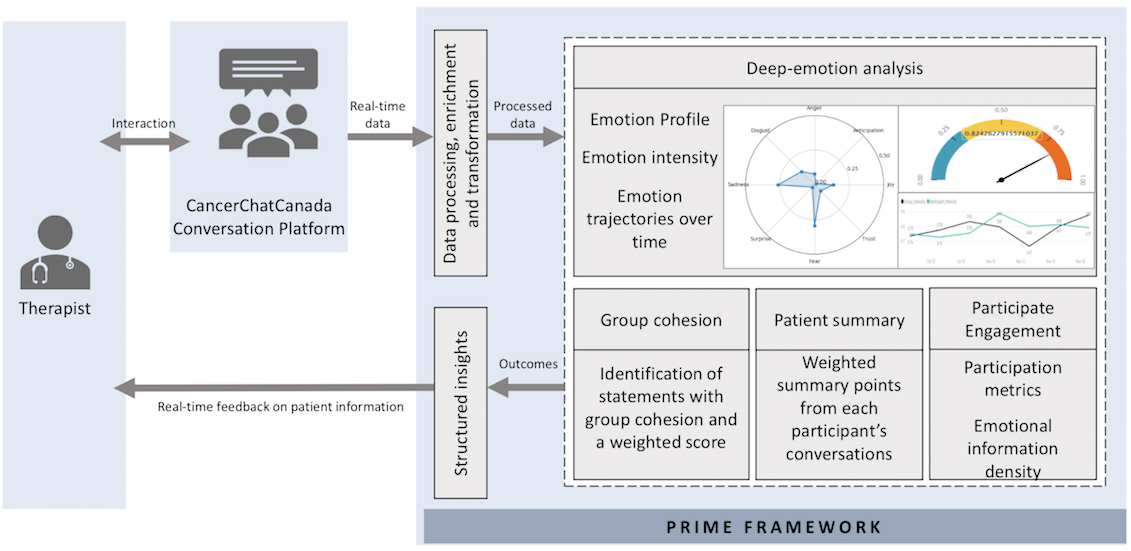
Text-based online support groups augmented with a new tool for detecting distress
Therapist-led online support groups can provide a safe space for people affected by cancer to discuss fear, normalize stress, build resilience and enhance coping. Cancer Chat Canada offers real time text-based support groups, but therapists who lead these groups often feel challenged to address the needs of each participant in the absence of visual cues. Recent Ontario-made advances in artificial intelligence (AI) may offer potential solutions.
In a paper recently published in JMIR Research Protocols, an Ontario-based research group outlines their new AI-enabled virtual therapy cofacilitator tool for online cancer support groups. The tool uses a machine learning algorithm based on interpreting patterns of speech and language to track support group participants’ progress in real-time, while providing feedback to the leading therapist.
The research initiative was supported by OICR through the OICR-Cancer Care Ontario (Ontario Health) Health Services Research Network, and led by Drs. Yvonne Leung and Mary Jane Esplen, experts in the psychological impact of cancer.

“Online support groups are accessible and effective at reducing cancer-related emotional distress, but it can be challenging to monitor individual participant distress and engagement while responding to multiple participants’ messages simultaneously,” says project lead Esplen, Professor and Vice-Chair, Equity and Mentorship in the Department of Psychiatry, University of Toronto and former Lead of the de Souza Institute. “With multiple participants typing at the same time, nuances of text messages and red flags for distress can sometimes be missed. Our tool serves as an AI-enabled cofacilitator that can enhance the therapist’s ability to address these concerns.”
With a tool that can detect and flag issues, therapists could prioritize concerns more effectively, provide more individualized support in real time, and direct treatment accordingly in a timely manner.
In 2020, the research group completed the first phase of their study, during which they developed the AI-enabled cofacilitator tool. Now, in the second phase, they are evaluating the tool’s effectiveness by scoring its ability to accurately output psychometric measures, such as fear, sadness and hopelessness.
“The goal is to visualize emotions and sentiments throughout therapy to make online group therapy more effective,” says first author Leung, who is an Assistant Professor at the University of Toronto. “We believe these tools and technologies can be used to strengthen person-centred care by attending to individual needs and expanding access to high-quality virtual health care. We’re delighted to be in the process of validating such a cutting-edge tool.”
Should effectiveness be demonstrated in their clinical studies, the group plans to integrate their AI-enabled cofacilitator into Cancer Chat Canada’s online psychosocial oncology services, and potentially adapt the cofacilitator algorithm for other cancer-related support services.
“We’re proud of the progress made so far,” says Esplen. “Our team was strategically built to incorporate different areas of expertise and different perspectives. We’ve tested each step along the way, and we look forward to building more tools to enhance patient therapy and care.”
Read more about the OICR-CCO Health Services Research Network on OICR News.
